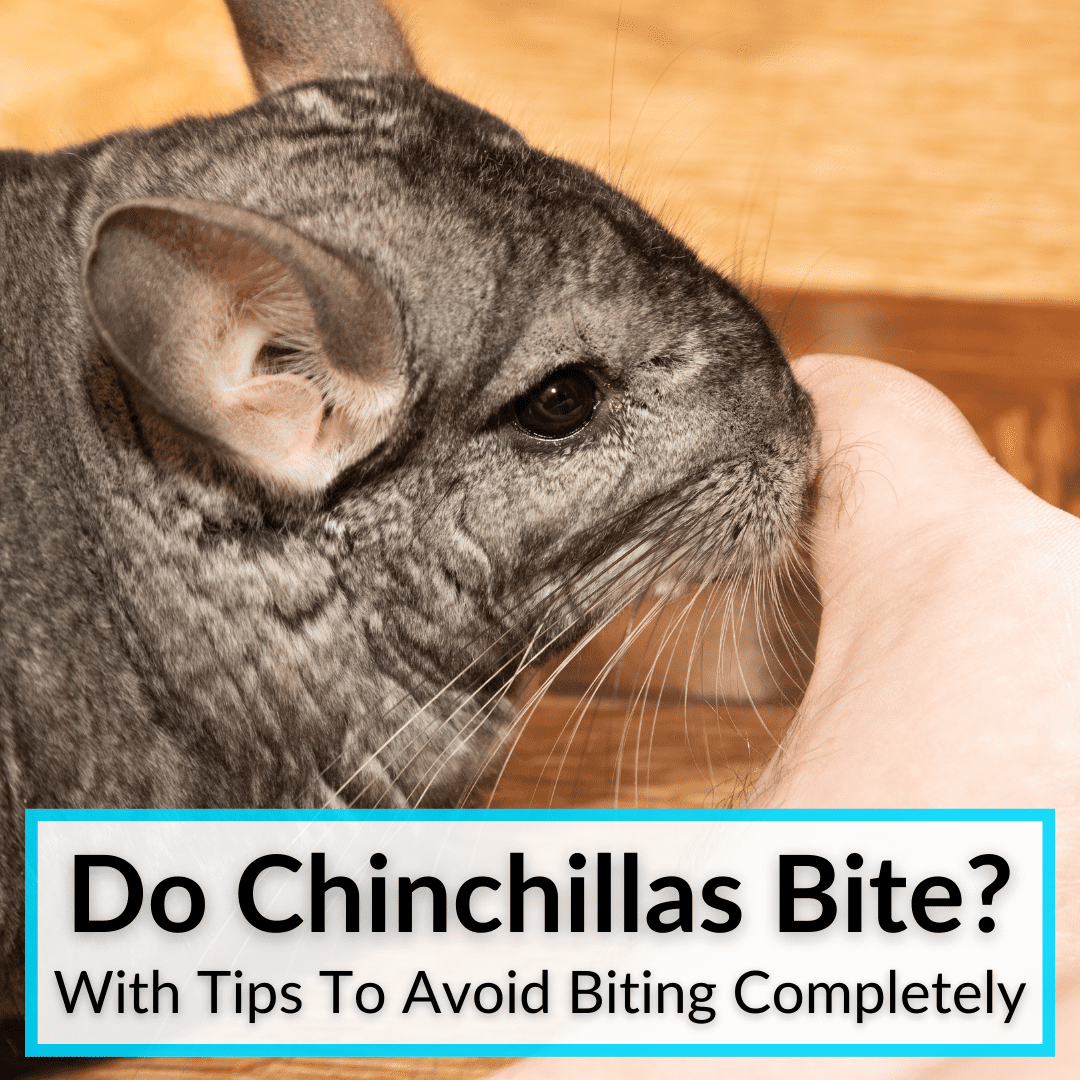
It tickles and is really just a love bite.
She is so friendly, tiny and cute that it is impossible to imagine her ever biting me for real.
It’s even harder to imagine it actually hurting.
But I’ve heard from chinchilla owners who report their pets have bitten them. And it apparently hurts quite a bit.
Do chinchillas bite often and is it something you need to worry about?
Keep reading for everything you need to know about chinchillas biting, from why it happens, to what to do if it does, to how you can prevent it from happening in the first place.
Contents
Do Chinchillas Bite?
Chinchillas may bite when they feel threatened or cornered. Most commonly, a bite occurs if your chinchilla has not yet adapted to its new environment or built trust and it somehow feels threatened.
It could feel threatened because you corner it, stick your hand through the cage, or otherwise make it feel like it is in danger and has no escape or safe hiding place.
The good news is that chinchillas do not bite often and you have plenty of steps you can take to ensure that biting never becomes a problem in the future.
I personally have never had my chinchilla bite me or anyone in my family.
But there have been some playful nibbles (more on this later)
However, basic knowledge and precautions can go a long way toward keeping those painful front teeth from piercing your skin, when first bringing a new chinchilla home.
So let’s go over everything you need to know about chinchillas biting and how to keep it from ever happening to you.

Be sure to check out my full digital eBook “Avoiding Critical Mistakes: Ultimate Chinchilla Care eBook” to get the best advice, tips, and tricks and supply recommendations to make adopting and caring for a chinchilla much more comfortable and easier to understand.
You can learn more about this eBook offer using the link directly below.
Learn more here:👉 Avoiding Critical Mistakes: Ultimate Chinchilla Care eBook Offer
Why Chinchillas Bite
In the wild chinchillas are preyed upon and usually the victims on the food chain. They are targeted heavily by other predators including us.
At one point, chinchillas nearly went extinct in certain countries, because we hunted them to such a staggering degree for their luxurious, thick, smooth coats of fur.
Naturally, when chinchillas feel threatened the first thing they want to do is to run away from danger and attempt to hide. And as tiny rodents in a big, scary world, chinchillas get scared relatively easily.
Because they get scared so easily, it is important to allow your new chinchilla to adapt to its new environment fully, before attempting to handle it too much, in order to avoid issues with biting.
Do not worry, this skittish time passes quickly. Soon your pet will begin to warm up to you.
But at first, it will spend a lot of time hiding. And if you corner, or otherwise make it feel threatened, it my bite. But that is understandable. Just try looking at it from their point of view.
They are inside of a relatively small cage, compared to the great outdoors they enjoy in the wild. This greatly reduces the ability to run away. Of course, we know the cage is safe, but your pet does not.
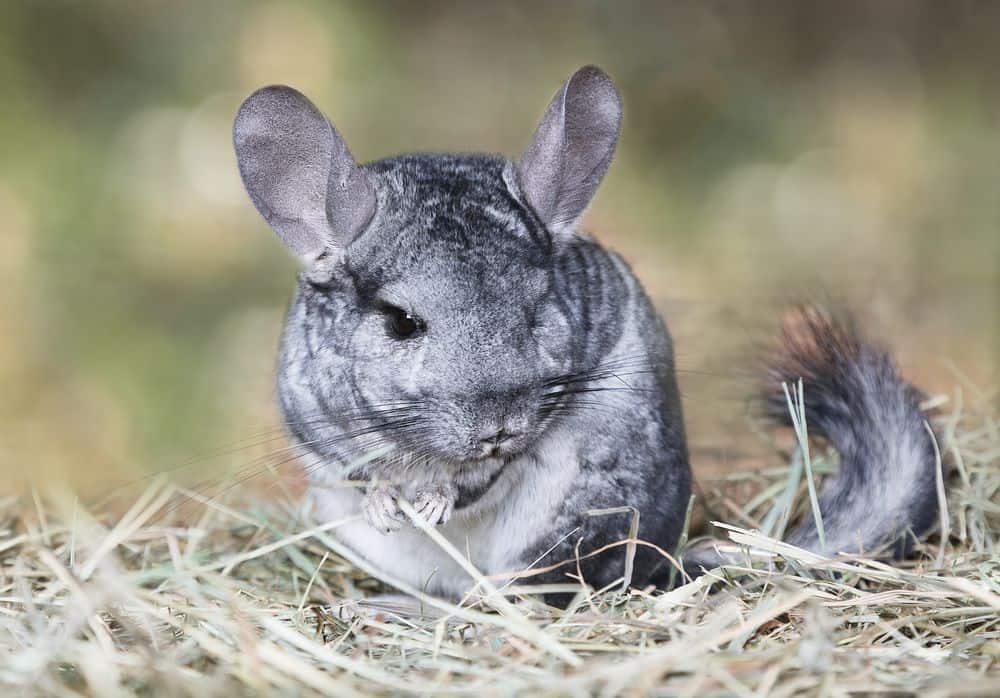
So when it feels threatened and can’t run, it has to choose a new path to confront the danger. Fight or flight. And since flight is no longer an option, only fight remains.
Unfortunately, for your fingers, this can mean that your pet may bite, if you make them it uncomfortable, cornered, or threatened.
Thankfully, there are steps you can take to help avoid chinchilla bites. It’s pretty easy to ensure that it never becomes an issue.
Let’s start with a question that is likely on your mind at this point.
Do Chinchilla Bites Hurt?
Yes, chinchilla bites can hurt. Chinchillas are known to have very long and extremely sharp teeth. This common among rodents.
In some instances, chinchilla bite wounds can pierce the skin, or the bite can be deep and cause a substantial amount of discomfort. But chinchilla bites are not dangerous, unless they get infected. So make sure you disinfect any bites thoroughly.
Luckily, as mentioned before, the only reason you might experience this form of a piercing deep bite is if you put your chinchilla in a position of feeling trapped or in danger.
It is more likely to occur if your chinchilla was raised in a non-social environment. This is one of the reasons I always recommend that you adopt your chinchilla from a local breeder.
When using a breeder, it is much more likely that your chinchilla has been socialized beginning at a young age, than animals that come from as pet store like PetSmart or PetCo.
Another factor that increases the likelihood of a chinchilla bit is if you don’t provide any hiding spot or escape route in the cage for your chinchilla to use when feels frightened.
But not all bites hurt. Some are done with love and aren’t really bites at all. These are the famous little nibbles.
Difference Between Chinchilla Biting And Nibbling
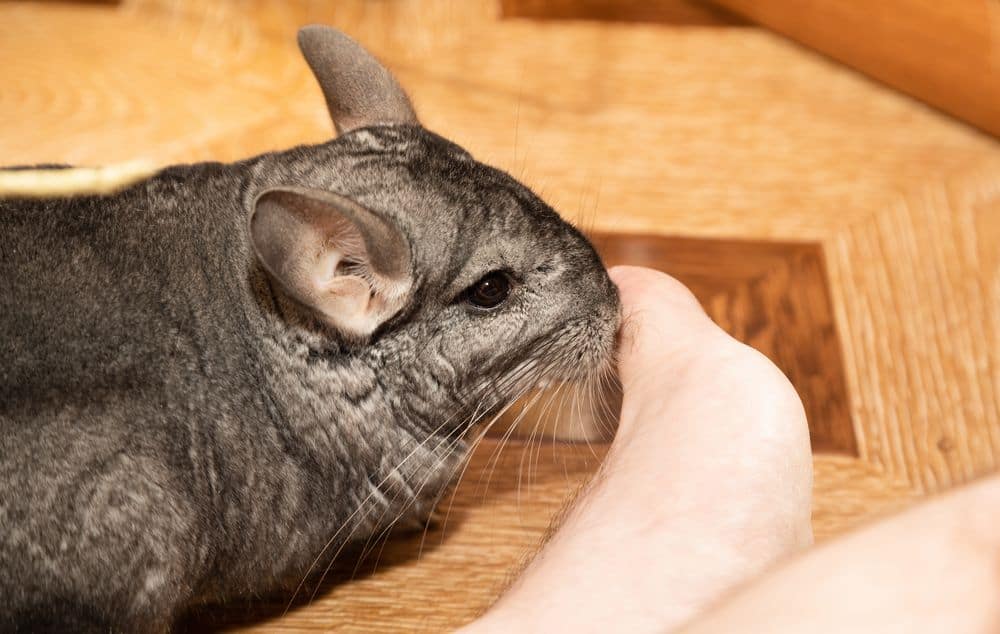
As a new chinchilla owner, it is important that you distinguishing the difference between a chinchilla biting and a chinchilla nibbling.
A legitimate bite is noticeable and much more forceful than a nibble. Typically, a bite occurs when no trust exists and you have frightened your chinchilla in a manner that made it feel as if it had no other choice.
A bite can also occur in some situations, when your chinchilla has not yet learned how hard it can bite down without hurting you. We can call this an accidental bite.
This process is learned through gentle nibbling and socializing your chinchilla in general. Nibbling is something you will likely always experience.
My chinchilla will nibble my fingers if I have any form of treats out or even just in a playful manner. This isn’t designed to hurt you and it is one of the ways your chinchilla shows love.
Trust me, you will begin to understand all of this within a few short weeks of owning a chinchilla and recognizing the body language they display.
How To Stop Chinchilla Biting
There are a few things you can do to help make your chinchilla more comfortable and ultimately reduce the chances that it bites you.
The first thing you can do is always provide some form of an escape for your chinchilla, which often comes in the form of a place to hide where it can feel safe.
The best way to do this is to provide the best chinchilla cage possible and also ensure you include multiple safe spots inside of the cage.
This helps ensure that your chinchilla does not feel trapped. This will dramatically reduce the chances of your chinchilla biting you in the beginning, when your trying to gain its trust and build a bond.
Most chinchilla owners agree that a nest box inside of the cage is a must in order to reduce biting. You can view my post about nest boxes here.
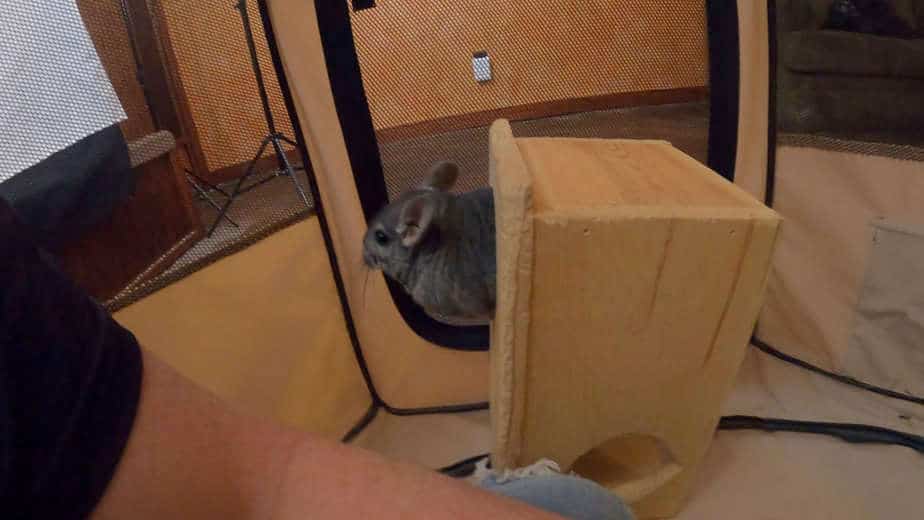
When reaching into the cage, your pet will feel more comfortable understanding that it has a way out that it can take, if need be.
A safe haven inside the cage, so to speak.
Outside of the other recommendations already mentioned previously, there are a few other key tasks you can work on to help prevent your chinchilla from biting.
Before we get to those, let’s summarize what we have discussed thus far: take it slow in the beginning with your new chinchilla and ensure you have a large cage with a nest box.
Build Trust With Your Chinchilla To Reduce Biting
Over time your chinchilla is going to begin recognizing your voice, smell, and overall presence when you enter a room. This part of the bonding and relationship growth is going to slowly build trust between you and your chinchilla.
The more interaction, talking and time together, the stronger this bond will grow. Get your chinchilla out of the cage 3 times a week for a dust bath.
During this time out, you also let your chinchilla play outside of the cage. Just be sure to chinchilla proof the room where you intend on allowing your chinchilla to roam.
You can also use other methods to build the bond and reduce chinchilla biting, like using a playpen with your chinchilla.
I used a playpen to build the bond with my chinchilla much faster, and I have never had an issue with my chinchilla biting, as I mentioned previously.
Dedicate time to holding and petting your chinchilla. You need to learn to get your chinchilla to enjoy being held. You also want to learn the best ways to get your chinchilla in and out of the cage. This shouldn’t be a tough task.
Chinchillas are naturally friendly. In most circumstances, they will not be bothered by some time cuddling, as long as you don’t overdo it.
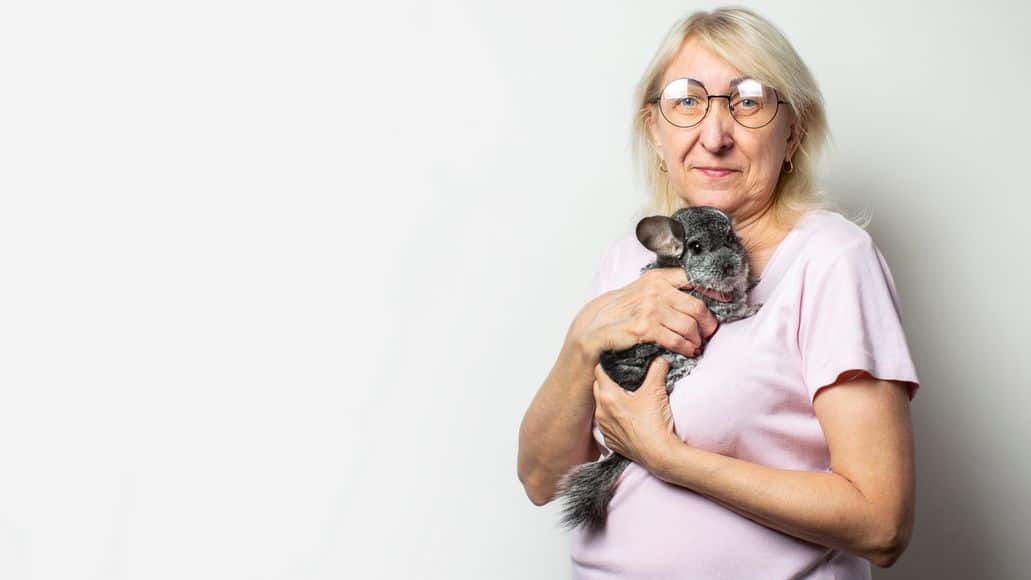
Doing this, while keeping a clean, smell free and safe environment for your chinchilla, will make the chances of your chinchilla ever biting you slim to none.
When I refer to clean, I’m referring to you actually taking the time to clean your chinchilla cage.
Also, you need to ensure the environment is always safe for your chinchilla, which includes keeping the room where your chinchilla lives at ideal temperatures.
While your pet will get used to you fairly quickly, I unfortunately can’t say the same for your friends, family, or strangers. Chinchillas will not get used to everyone else nearly as quickly.
This makes it important to always educate friends and family about putting their fingers in the chinchilla cage or doing anything that may cause your chinchilla to feel scared, thus provoking a chinchilla bite.
Always exercise caution with others handling your chinchilla. Instruct them on how to properly handle your chinchilla to avoid the chances of them taking one of the sharp-toothed chinchilla bites right to the finger.
Chinchilla Bites: Other Concerns
Besides the potentials for a bite to penetrate the skin easily, you don’t have much to be concerned about if your chinchilla bites you.
Only in rare instances has a chinchilla bite carried infections or caused other issues. If you do ever take a bite from your chinchilla, don’t get too stressed out.
A rinse under some water and a band-aid, if needed, should take care of the issue quickly.
Can chinchillas get rabies and pass it on to us? Theoretically yes, but if you keep your pet indoors (as you should) there is not much chance it would come into contact with an animal that has rabies.
How Hard Do Chinchillas Bite?
You may also be wondering if your chinchilla does bite you, how hard do they bite?
This is tough to answer and will depend on the level of fear, anxiety and stress your chinchilla feels when it decides to bite.
Your chinchilla may also bite you for other reasons such as the following.
This is when it is important to understand the difference between biting and playful nibbles. Be sure to refer to the previous section of this post to gain a better understanding of the differences between the two.
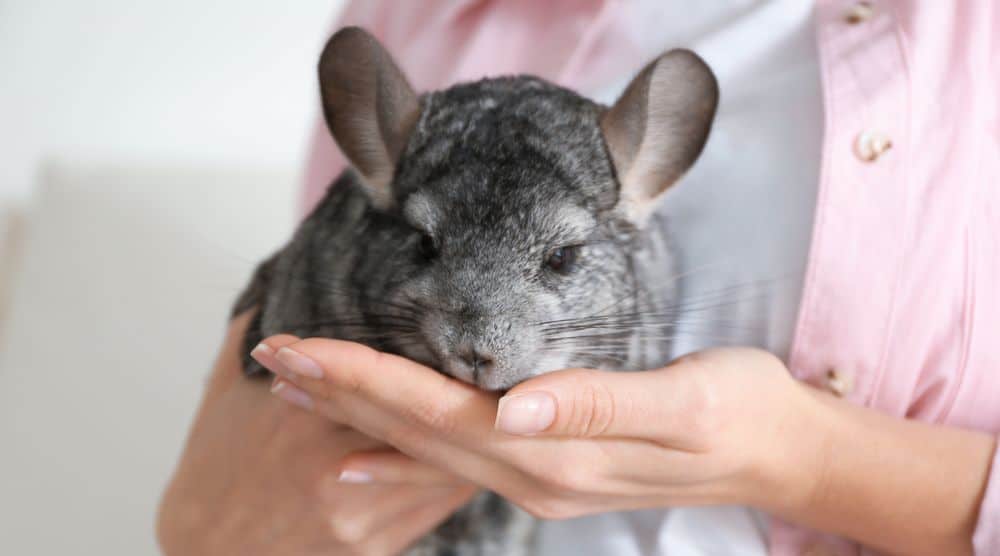
Do Chinchillas Bite Often?
No, chinchillas typically do not bite often. In fact, as mentioned, they bite very rarely. Outside of smelling food on your hands or being startled or agitated your chinchilla shouldn’t bite at all.
Especially once you build trust with your chinchilla.
Lastly, as stated before, they may feel the need to bite you or nibble you to inform you of the need to use the restroom (so to speak).
Why Does My Chinchilla Nibble Me?
As mentioned above, a nibble is very different from a bit. It is common and completely harmless. In fact, it is generally a good thing.
Your chinchilla may nibble on your fingers when you have treats. It is also a common form of playing and shows they your pet loves and trusts you.
In short, if your chin is nibbling on your fingers, you do not need to worry. Quite the opposite. This is something to be happy about.
Use Gloves To Handle Chinchillas That Frequently Bite
While biting is not a behavior you likely need to worry about with a new chinchilla, it is still nice to know you have options and a way to safeguard your fingers, until your chinchilla trusts you and no longer feels scared in its new environment.
If you have anxiety about reaching into the cage during the first few weeks, I recommend wearing a pair of gloves to protect your fingers.
A basic pair of leather gloves will get the job done. It does not need to be anything fancy and you likely will only need them for a week or two, until you are comfortable a bite is no longer likely.
I personally never needed to take this approach but can certainly understand how it may make you feel better about reaching into the cage with a chinchilla you just adopted a day or two ago.
Chinchillas Biting: Final Thoughts
To put all the pieces together, your chinchilla is a loving, harmless creature and it biting should not be a significant concern, if you intend on adopting a chinchilla in the near future.
Follow the tips discussed in this post to keep your chinchilla feeling safe and comfortable, in order to reduce the chances of a bite happening.
In addition, begin building trust with your chinchilla by actively spending time with him or her, providing dust baths, and giving it the occasional nice gentle scratch under the ears or chin.
Once you have established trust, you needn’t worry about your chinchilla biting you anymore.
Chili and I wish you the best of luck with your new chinchilla and hope biting is never an issue you have to deal with, now or in the future.
Share your thoughts about your chinchilla biting.
What’s your experience with your chinchilla biting?
What did you do to remedy the problem?
Be sure to share your thoughts, stories, and concerns about chinchilla biting by dropping a comment below.
As always, Chili and I appreciate you stopping by and reading today and we will see you again next time!
Debbie says
Hello , my 7 month old female chinchilla has started to bit . This is not because she is feeling threatened, she attacks my hand and runs back and forth , having a temper tantrum if she doesn’t get her own way. For instance chewing on walls, skirting boards and furniture.she is very loving and don’t know why she does this . I just think that she is just like a toddler having tantrum s.
Josh Martin says
Hey Debbie, Thanks for the comment. It sounds like you may be correct on this. I haven’t had my chinchilla do this yet but I can definitely see it being possible with some of the attitudes they can display from time to time.
Be sure to keep us posted if this behavior continues and thanks for reading the blog!
Helen says
You didn’t mention grooming 🙂 although this is usually done gently, it can occasionally have a slightly harder nip or two. Or be mistaken for biting by someone not used to it.
Sometimes chinchillas will gently nibble on your hand, arm or fingers. This is a type of grooming behavior chinchillas normally do to each other. One chinchilla grooms the other for a few minutes and then they trade back and forth. Your chinchilla may gently nibble for a bit and then stop. He/she is waiting for you to reciprocate. Often you can give some gentle scratches under the chin, between the front paws, around the neck, down the back or even around the face.
Mine does this and gets huffy with me if I don’t carry on until she’s ready to stop 😂